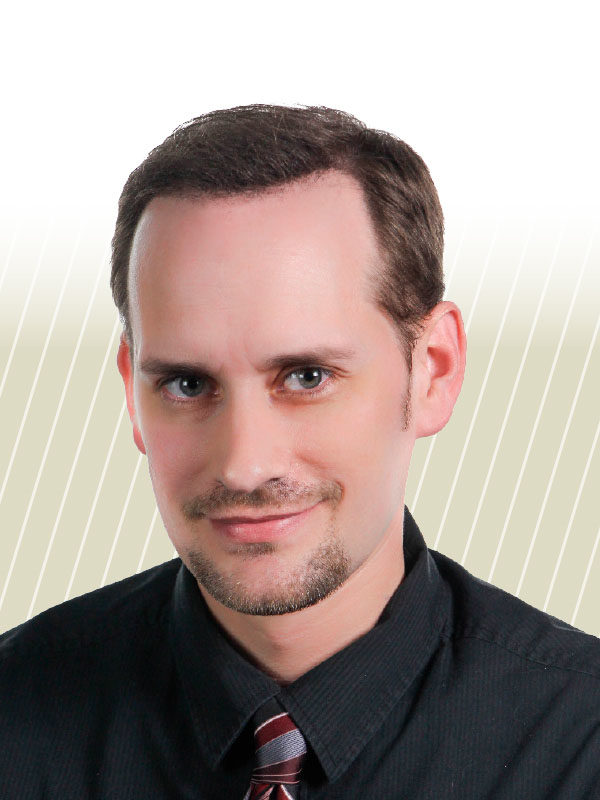The accounting team teased Danny Langston about “moving to the dark side” when he transitioned in September to his new role as a business faculty instructor at Lake Michigan College, Benton Harbor.
“It’s all in good humor,” he explains. “We know we can’t have administrative staff without academics and vice versa. One hand washes the other.” At the start of the fall semester, Langston moved to a full-time faculty position, but before that he was a staff accountant in the finance department, as well as an adjunct instructor of accounting.
“At one point, I was teaching 15 contact hours and still working 40-plus hours a week in the finance office. If there were enough hours in the day—and that schedule made for a sustainable lifestyle—I would continue to do both, because I love them equally,” he insists.
How did you end up at Lake Michigan College?
Some people can spend an entire career in public accounting. For me, after a few years of paying my dues, I was looking for something more meaningful. I remembered the words of a celebrity, Conan O’Brien, who in an interview talked about how to break into show business. He said, “Go to the place where they are making the thing you like.”
Right away, I thought about education. It has improved my life, my options, and my skills. With education, I have a chance to be a part of something greater that helps the community and society. When I saw an opening at Lake Michigan College, which has a great reputation, it was the perfect combination of opportunity and timing for me.
I understand that you’re just completing a law degree. What made you decide to go to law school?
I had always wanted to go to law school because I thought that [being a lawyer] was what I wanted to do for a living. And, admittedly, I also wanted to see if I was smart enough. I immediately learned that being smart is not an issue; smart people get kicked out every week, and many smart people don’t bother applying.
Law school is really more of a test of endurance, commitment, and sacrifice.
Your career seems to be taking a number of turns. Where do you hope to end up?
Teaching. As one of our newest full-time faculty members, I’m teaching accounting, tax, and business law courses. I see myself growing in this role.
In the past year, you’ve been a full-time accountant, an adjunct instructor, and a law student. Any time management advice you want to share?
Keep going. After a full day of working in the finance office, it was hard to go home and do homework when I really wanted to throw in the towel for the night. A trick that I picked up to combat fatigue was to set my timer for 10 minutes, telling myself that was my stopping point. When the alarm went off, I found that I could keep going because I was in the groove.
You have worked on both sides of the fence: academic and administrative. How can institutions improve the relationship between the two?
We’re all on the same team, so I believe it ultimately comes down to communication. Let me give you an example: A while back, we adopted a new policy that would give faculty and staff a per diem rather than a reimbursement for meal expenses at overnight conferences. We ran all these numbers, pulled invoices, and did a lot of research and analysis. We got the policy through the appropriate channels, implemented it, and set up different times and appointments where we could conduct classes and show faculty and staff members how to process the new paperwork. We thought we had all of our bases covered.
To us, it was very straightforward. Of course, we’d been working on it for a year and a half. It turns out that our efforts—even though they were at the time our best efforts to reach everybody—weren’t enough. Some faculty members didn’t understand why we were doing it and why we didn’t educate everyone. Through the process, we learned that we could have communicated more.
They thought that we just rushed into a new process and failed to communicate. We thought, “Well, we’ve communicated it. Why aren’t you following it?” These kinds of misdirects can lead to frustration between two different parts of the team.

What’s the most important professional lesson that you have learned?
Good manners are always in style. That advice, which has kind of become my mantra, has never steered me wrong. When you get a nasty e-mail, resist the urge to respond rudely or nastily. Instead, turn it into a positive interaction. For example, if people got frustrated with the accounting department, I tried to respond with a sincere, friendly, and polite attitude. It can completely take the heat out of a situation.
How do you unwind from the pressures of the job?
When I give myself permission to unwind, I love to travel with my wife, Ana, and our twin boys, Anthony and Andrew. We’ve done road trips to South Dakota, Iowa, Kentucky, and Colorado. We stop at all kinds of great places, such as the Field of Dreams. It’s great to have those experiences and memories. Plus, just planning the trip can get you through so many stressful days.
So who does the planning?
Usually my wife and I will come up with the structure, but our sons, who are 12, are getting old enough to have input. It’s a collaborative effort. If we see a roadside attraction, we stop. There’s a lot of spontaneity, which is fun.
Have you overcome any personal challenges?
Yes. I once had a manager tell me, “You deserve everything you tolerate.” At that time, I was working two full-time jobs, I was in a toxic relationship, and I wasn’t happy. I was working hard and playing by the rules, but the situation wasn’t working. I realized that I was making excuses rather than making hard decisions.
I wanted to go back to school for my bachelor’s degree but couldn’t figure out how to fit it into my schedule while working 80-plus hours a week. I told myself, “I can’t do this. I don’t have time. I can’t afford to lower my hours, and I’m too old to go back to school anyway. It would be embarrassing.”
I found that I had to get over my tendency to make excuses. I took a hard look at my life, at the obstacles, and how I could remedy or change the situation. I decided to take charge of my life, and carved out what I wanted to be instead of being doomed to live out the rest of my days on a hamster wheel.
I had gotten to the point in my life where, without a degree, I was stuck. Now I feel like the whole world is open to me, and I can look for ways to improve my teaching, increase my knowledge base, and find more ways to give back. I don’t want to get comfortable and think I’ve done enough. I haven’t.
MARGO VANOVER PORTER, Locust Grove, Va., covers higher education business issues for Business Officer.



